In this edition of court judgements review, we look at the Supreme Court’s judgements on grounds for review for change in law in subsequent ruling, punishing doctors for storing small quantities of drugs and medicines, bail cancellation for serious offences, Delhi High Court’s judgement on applicability of RTI Act for non-citizens and Kerala High Court’s judgement on grounds for bail.
Supreme Court: Split verdict on whether change in law as a result of Court’s subsequent ruling serve as a justification for review?
In Govt. of NCT of Delhi Through the Secretary, Land and Building Department and Anr. vs. M/s. K.L. Rathi Steels Limited and Ors, the apex court delivered a split verdict, on whether a judgement can be reviewed since the ruling on which the earlier judgement was delivered was eventually overturned by the court.
The two-judge bench of the Supreme Court comprising of Justice MR Shah and Justice BV Nagarathna was hearing a review petition on whether the decision in Indore Development Authority vs. Manoharlal (2020) that overruled the judgement of Constitution Bench in Pune Municipal Corporation vs. Harakchand Misirimal Solanki (2014), be a ground for review. While Justice MR Shah allowed the review petitions, Justice BV Nagarathna dismissed the review petitions.
In Pune Municipal Corporation vs. Harakchand Misirimal Solanki, the court interpreted Section 24 of the Right to Fair Compensation and Transparency in Land Acquisition, Rehabilitation, and Resettlement, 2013. The interpretation of Section 24(2) was referred to a Three-Judge Bench in the case of the Indore Development Authority vs. Shailendra. After considering the issue, the Bench determined that Pune Municipal Corporation did not cover all relevant aspects of the interpretation, and the matter was referred to a larger bench. A Constitution Bench overturned Pune Municipal Corporation and all other rulings that had relied on that judgement in Indore Development Authority vs. Manoharlal. The current batch of petitions was filed by land acquiring authorities/States requesting a review of the Special Leave Petitions and Civil Appeals that were decided in accordance with the ruling in Pune Municipal Corporation following the decision in Indore Development Authority.
The counsel for respondents argued that the judgement in Indore Development Authority had no precedential authority and an explanation of Order XLVII of Rule 1 of Code of Civil Procedure,1908 provides that where a judgement on a legal issue has been reversed or amended by a later decision of the Superior Court, that shall not be a basis for reviewing that judgement.
Justice MR Shah, in his judgement held that the judgement in Indore Development Authority was made primarily based on the earlier ruling in Pune Municipal Corporation, which was questioned and ultimately overturned by a Constitution Court. Further, the approval of the review applications, according to Justice MR Shah, will be in the “greater public interest” given that the land acquisitions would otherwise expire. Justice MR Shah allowed the review petitions.
However, Justice BV Nagarathna differed from the above opinion. In her Judgement, she relied on the Supreme Court Rules 2013 that provide for the scope of review.

Further, the explanation for rule 1 of Order XLVII of the Code of Civil Procedure, 1908 states that merely because a judgement was reversed or modified in subsequent rulings shall not be a ground for review.
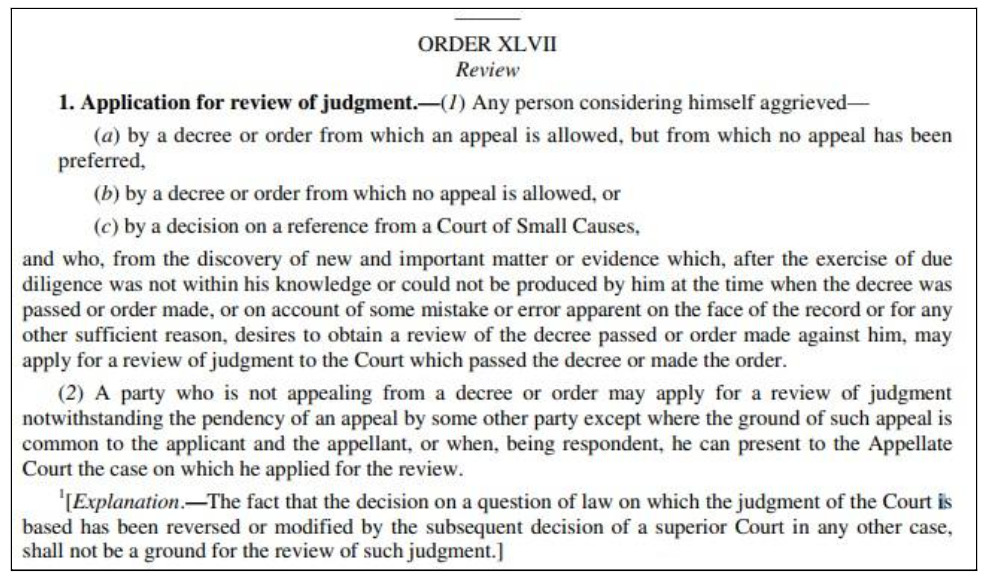
Further, she held that the third ground for review, ‘on account of any other sufficient reason’, must be similar to the two other reasons. Even if a broad meaning is given to the above ground, it results in no finality of judgements, and hence the purpose of the explanation that is provided is to bring finality to the cases. Accordingly, Justice BV Nagarathna dismissed the review petitions.
Supreme Court: Doctors cannot be punished for storing small quantities of medicines under the Drugs and Cosmetics Act 1940.
The apex court quashed the criminal proceedings against a doctor under the Drugs and Cosmetics Act 1940, for storing small quantities of medicines in S. Athilakshmi vs. The State Rep. by the Drugs Inspector. It held that a doctor’s act of storing modest quantities of medications will not amount to a crime of unauthorised stocking of medications under Section 18(c) of the above act. It further noted that such quantities can be easily found in the consultation room of the doctor.
The two-judge bench comprising of Justice Krishan Murari and Justice Sudhanshu Dhulia was hearing a special leave petition filed by the Doctor against the criminal proceedings on her on account of the inspection carried out by the Drug inspector in her premises, where a certain quantity of medicines and lotions were found. The inspector filed a request for a sanction for prosecution with the office of the Director of Drugs Control, Tamil Nadu, alleging that she had drugs on hand for sale and sold them without a valid drug license, punishable under section 27(b)(ii) of the aforementioned Act. In response to receiving the sanction in January 2018, the Inspector filed a complaint at the Magistrate Egmore about pursuing the Appellant under Section 18(c) of the 1940 Medicines and Cosmetics Act. Upon challenging the proceedings before Madras High Court, the High Court dismissed the petition.
The apex court relied on the Schedule K of the Drugs and Cosmetics Rules, 1945, which exempted certain drugs from the provisions of the Chapter IV of the act. It held that this exemption is in the favour of the appellant and has exemptions from both section 18 and section 27, that are applied in this case. Entry 5 of the Schedule K of the above rules is as follows.

The court further held that since the quantity of the drugs found is extremely small, and it can easily be found in a doctor’s office or consultation premises, no offence can be made out in the present case. Rule 123 of the rules when read with schedule K provides adequate benefit for the practitioners.
The Court also found fault with the judgement of the Madras High Court and the sanctioning authority for not examining properly whether such a case could be made out considering the small number of medicines recovered given that the appellant is a registered medical practitioner. Accordingly, the proceedings against the registered medical practitioner are quashed.
Supreme Court: Subsequent addition of serious offence to FIR can be a ground for cancellation of bail.
The Supreme Court, in Ms. X vs. State of Maharashtra, has again reiterated that even if an order of bail was previously granted in the accused’s favour in relation to the offences with which he/she was charged when his/her application for bail was taken into consideration and a favourable order was passed, the addition of a serious offence can be a circumstance where a court can order that the accused be arrested and committed to custody.
The two-judge bench comprising Justice AS Bopanna and Justice Hima Kohli was hearing an appeal filed by the victim. The initial FIR was registered for offences punishable by Sections 354, 354-B, and 506 of the Indian Penal Code. The accused was given bail by the magistrate. Her further statement was then recorded, and the FIR was amended to include the charge of rape (Section 376 IPC). In addition, the police requested the bond be revoked based on further information. The Magistrate granted the request to revoke the bail. In the meanwhile, the accused unsuccessfully petitioned the Sessions Court for anticipatory bail. Afterwards, the Bombay High Court granted anticipatory bail to the accused, which the victim challenged and appealed to the Supreme Court.
The apex court held that the Bombay High Court erred in its judgement and held that the High Court ignored the gravity and seriousness of the allegations and the financial stature, position and standing of the accused to that of the victim before arriving at such conclusions.
The apex court further relied on the judgement in Prasanta Kumar Sarkar vs. Ashis Chatterjee and Another, wherein the conditions for the grant of anticipatory bail were discussed.
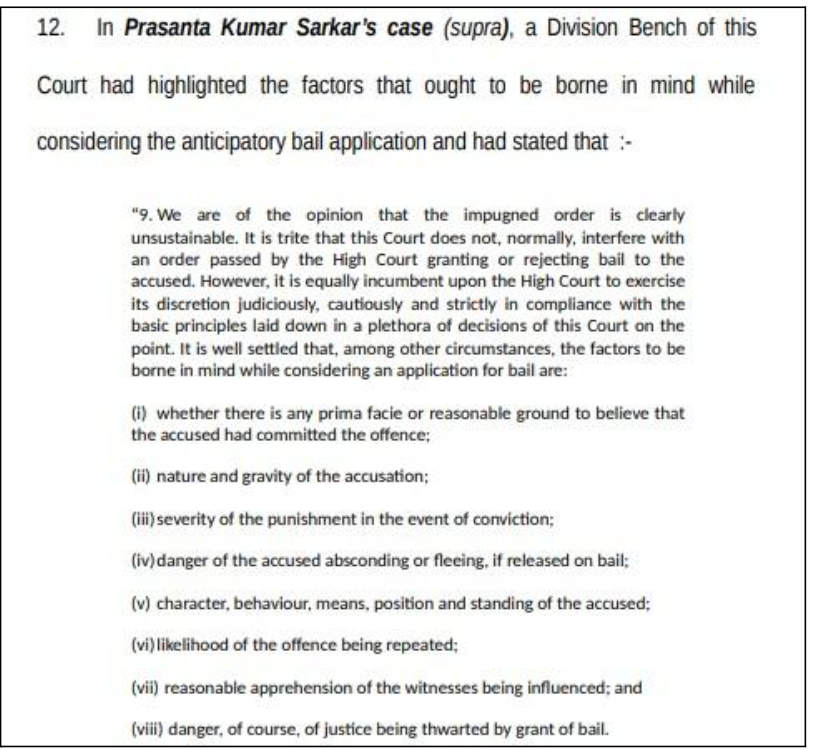
Further, in Pradeep Ram vs. State of Jharkhand and Another, a division bench of the apex court held that,
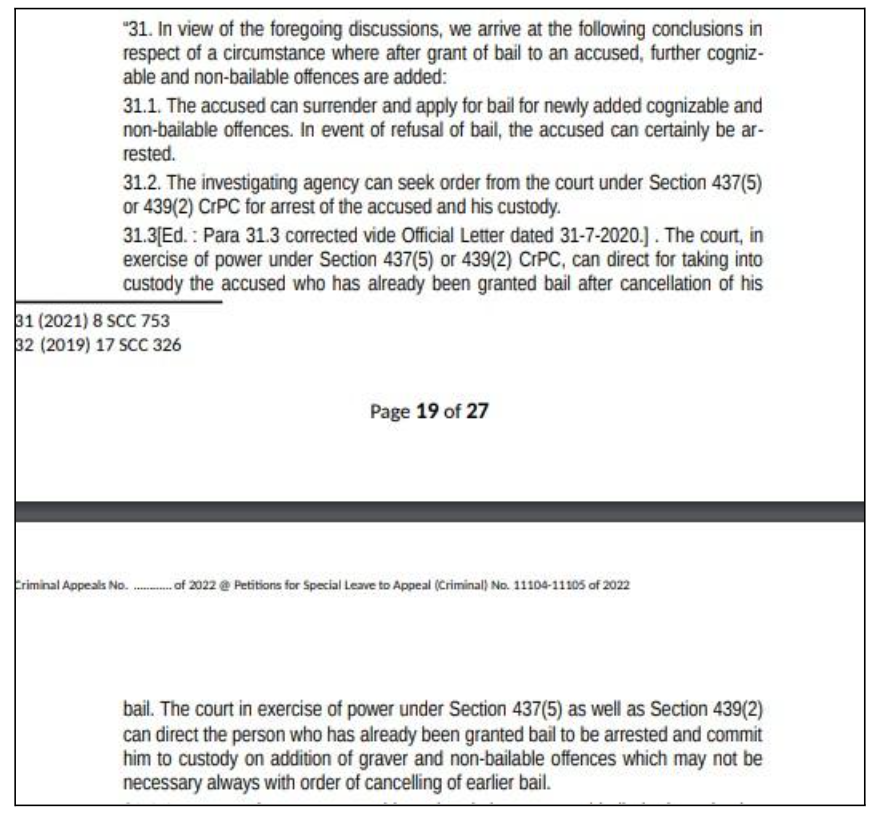
Accordingly, the orders granting anticipatory bail were set aside.
Delhi HC: Restricting the Right to Information to only citizens would be contrary to the purpose and object of the RTI Act itself.
In A S Rawat vs. Dawa Tashi, the Delhi High Court held that because the terms “citizens” and “persons” are used interchangeably throughout the RTI Act, restricting access to information to only citizens would go against both the letter and the spirit of the Constitution. It further held that both citizens and non-citizens should have access to the right to information according to the type of information sought and the acknowledgement of the rights granted to such a class of people under the Indian Constitution.
The Single Judge bench headed by Justice Pratibha Singh was hearing a plea filed by the Public Information Officer (PIO) of the Central Tibetan Schools Administration. Earlier, the PIO had refused to provide the information requested by a Postgraduate Teacher (Tibetan) working at the Central School for Tibetans in Darjeeling, regarding his employment confirmation letter, Children’s Education Allowance, All India LTC benefit, etc. The PIO rejected the petition stating that the applicant was a Tibetan National. The first appeal against the PIO was unsuccessful, whereas, in the second appeal, the CIC imposed a penalty on the PIO for refusing to provide information on the baseless suspicion of the citizenship of the teacher. The PIO filed the appeal against this in High Court.
Upon hearing the counsels, the Delhi High Court held that the CIC was correct to rule that if the authority thinks it appropriate to provide the material, there is no outright ban. Both citizens and non-citizens are dealt with by public authorities in India as stated under the RTI Act. While it would be true to say, generally speaking, that all citizens have the right to information, it cannot also be said that the revelation of information to non-citizens is completely forbidden. If such public entities fail to act or operate in an opaque manner when dealing with matters involving non-citizens, it cannot be stated that a non-citizen would be prevented from requesting the information in question under the RTI Act.
It further held that,
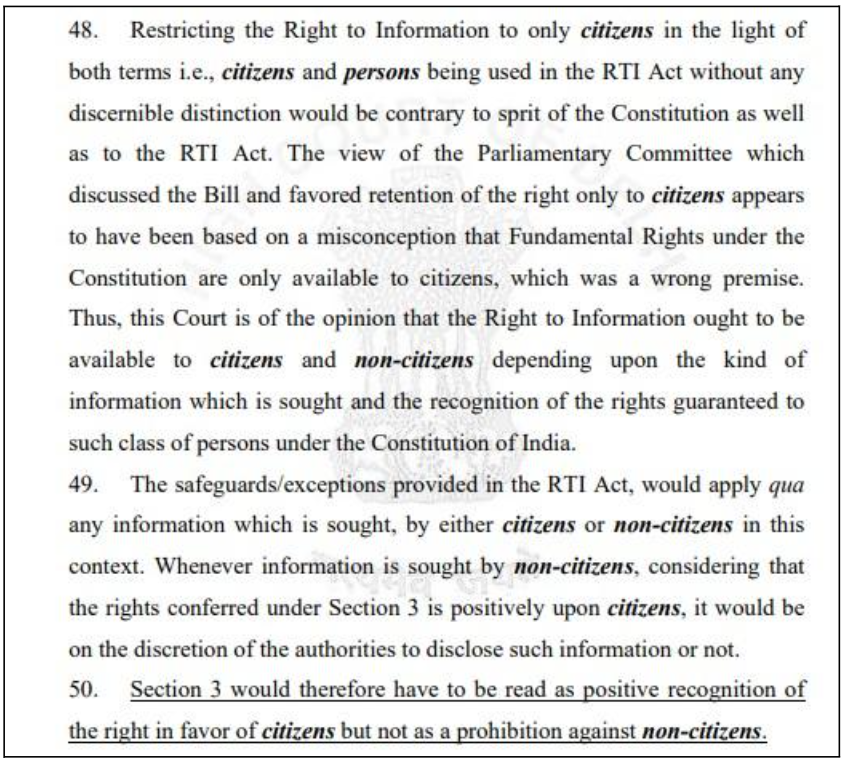
Additionally, the High Court also found fault with the CIC’s finding that the PIO’s conduct is mala fide, and the imposition of penalty is not sustainable. Accordingly, the imposition of penalty is set aside.
Kerala HC: Three Grounds for Bail as enumerated in Susanta Ghosh not exhaustive, enumerates more factors.
In George Kurian @ Pappan vs. State of Kerala & Anr, the Kerala High Court held that the grounds for bail as laid down in the Susanta Ghosh vs. State of West Bengal are not exhaustive and many other factors would govern the grant of bail.
A single-judge bench headed by Justice A. Badharudeen was hearing the application for bail by the accused where he alleged to have committed offences punishable under Section 302 of the Indian Penal Code and under Section 27(1) of the Arms Act,1959. The counsel for the petitioner relied on the grounds enumerated by the apex court in the Susanta Ghosh case, which are as below.
- chances of tampering with the evidence,
- chances of interfering with the investigation and
- chances of absconding.
If the above chances are found to the negative, the petitioner is liable to be released on bail. However, the prosecutor opposed the bail on the grounds that the accused demanded money and also arranged for a person to threaten the investigating officer. Further, they argued that the above grounds are not exhaustive, and many other factors govern the grant of bail.
Upon hearing both counsels, the High Court agreed with the arguments of the prosecution and held that such a list is not exhaustive. Further, it lists out the grounds based on various other judgements of the apex court as below.
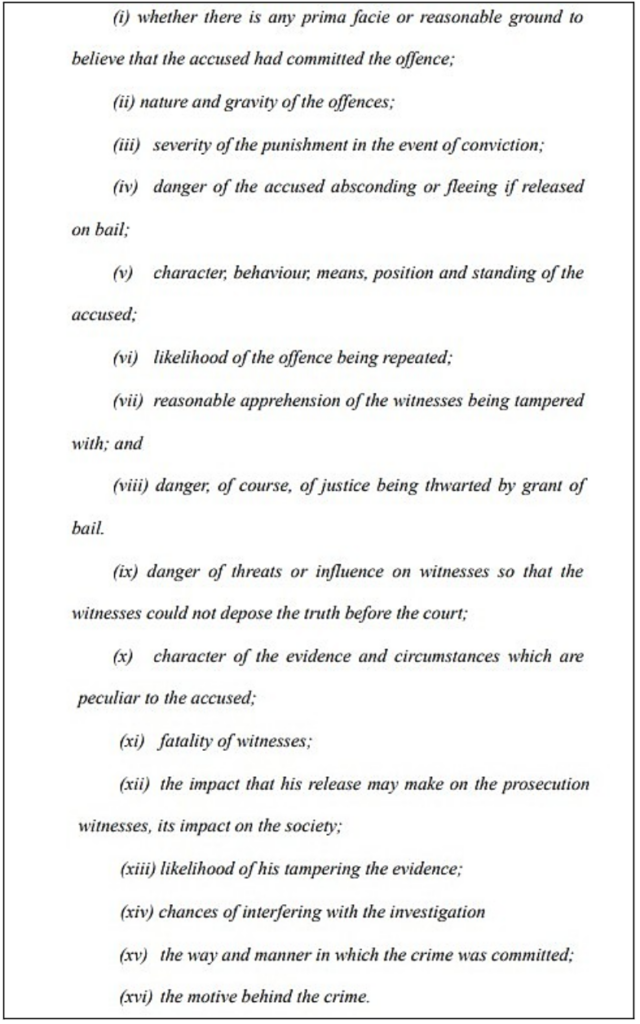
Accordingly, the petition was dismissed, and the magistrate was directed to expedite the trial and complete the same as scheduled.


